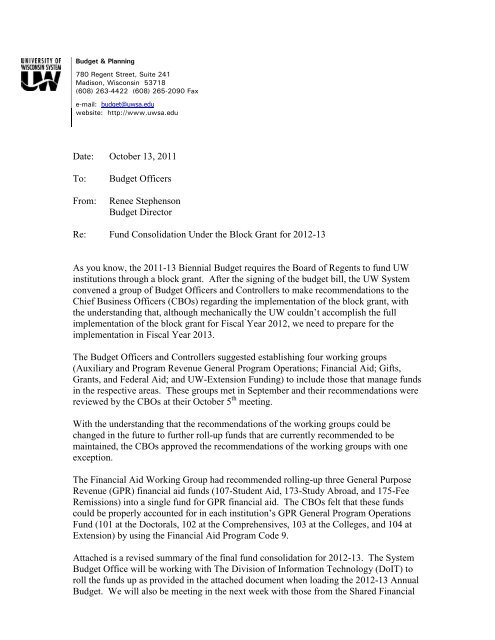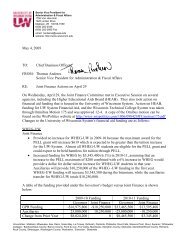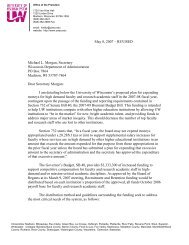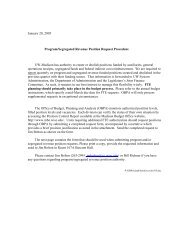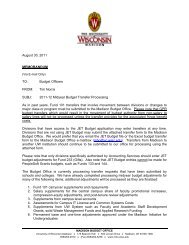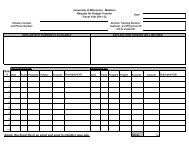Final Fund Consolidation Memo for FY13 - Madison Budget Office
Final Fund Consolidation Memo for FY13 - Madison Budget Office
Final Fund Consolidation Memo for FY13 - Madison Budget Office
You also want an ePaper? Increase the reach of your titles
YUMPU automatically turns print PDFs into web optimized ePapers that Google loves.
<strong>Budget</strong> & Planning<br />
780 Regent Street, Suite 241<br />
<strong>Madison</strong>, Wisconsin 53718<br />
(608) 263-4422 (608) 265-2090 Fax<br />
e-mail: budget@uwsa.edu<br />
website: http://www.uwsa.edu<br />
Date: October 13, 2011<br />
To:<br />
From:<br />
<strong>Budget</strong> <strong>Office</strong>rs<br />
Renee Stephenson<br />
<strong>Budget</strong> Director<br />
Re: <strong>Fund</strong> <strong>Consolidation</strong> Under the Block Grant <strong>for</strong> 2012-13<br />
As you know, the 2011-13 Biennial <strong>Budget</strong> requires the Board of Regents to fund UW<br />
institutions through a block grant. After the signing of the budget bill, the UW System<br />
convened a group of <strong>Budget</strong> <strong>Office</strong>rs and Controllers to make recommendations to the<br />
Chief Business <strong>Office</strong>rs (CBOs) regarding the implementation of the block grant, with<br />
the understanding that, although mechanically the UW couldn’t accomplish the full<br />
implementation of the block grant <strong>for</strong> Fiscal Year 2012, we need to prepare <strong>for</strong> the<br />
implementation in Fiscal Year 2013.<br />
The <strong>Budget</strong> <strong>Office</strong>rs and Controllers suggested establishing four working groups<br />
(Auxiliary and Program Revenue General Program Operations; Financial Aid; Gifts,<br />
Grants, and Federal Aid; and UW-Extension <strong>Fund</strong>ing) to include those that manage funds<br />
in the respective areas. These groups met in September and their recommendations were<br />
reviewed by the CBOs at their October 5 th meeting.<br />
With the understanding that the recommendations of the working groups could be<br />
changed in the future to further roll-up funds that are currently recommended to be<br />
maintained, the CBOs approved the recommendations of the working groups with one<br />
exception.<br />
The Financial Aid Working Group had recommended rolling-up three General Purpose<br />
Revenue (GPR) financial aid funds (107-Student Aid, 173-Study Abroad, and 175-Fee<br />
Remissions) into a single fund <strong>for</strong> GPR financial aid. The CBOs felt that these funds<br />
could be properly accounted <strong>for</strong> in each institution’s GPR General Program Operations<br />
<strong>Fund</strong> (101 at the Doctorals, 102 at the Comprehensives, 103 at the Colleges, and 104 at<br />
Extension) by using the Financial Aid Program Code 9.<br />
Attached is a revised summary of the final fund consolidation <strong>for</strong> 2012-13. The System<br />
<strong>Budget</strong> <strong>Office</strong> will be working with The Division of In<strong>for</strong>mation Technology (DoIT) to<br />
roll the funds up as provided in the attached document when loading the 2012-13 Annual<br />
<strong>Budget</strong>. We will also be meeting in the next week with those from the Shared Financial
System (SFS) and Human Resources System (HRS) to begin discussions on the full<br />
implementation of the funding consolidation <strong>for</strong> each of the respective Systems<br />
beginning in Fiscal Year 2013.<br />
It should also be noted that the Working Group on Auxiliaries and Program Revenue<br />
General Program Operations recommended changes to what should appropriately be<br />
charged to <strong>Fund</strong> 128 (Auxiliary Enterprises) and <strong>Fund</strong> 136 (General Operations<br />
Receipts). That recommendation was also accepted and the meeting notes which explain<br />
the new definitions are attached. Institutions should submit their 2012-13 auxiliary<br />
budgets in line with these recommendations. Financial Administration will update all<br />
related Financial Policies by July 1, 2012.<br />
At the recommendation of the UW-Extension <strong>Fund</strong>ing Working Group an additional<br />
working group (or working groups if needed) will be established to review the Academic<br />
In<strong>for</strong>mation Series (ACIS) 5 and Board of Regent Policy Section 18 regarding the<br />
interinstitutional agreement process, how UW-Extension related funding should be<br />
allocated, budgeted, and accounted <strong>for</strong>, and to clarify the differentiation between the use<br />
of <strong>Fund</strong> 189 (Credit Extension) and <strong>Fund</strong> 131 (Academic Student Fees).<br />
The Working Group on Utilities will also continue to work throughout Fiscal Year 2012<br />
to provide the CBOs with principals and funding distribution recommendations.<br />
If you have any questions regarding the fund consolidation please let me know.<br />
CC:<br />
Chief Business <strong>Office</strong>rs<br />
Auxiliary <strong>Budget</strong> <strong>Office</strong>rs<br />
<strong>Fund</strong> <strong>Consolidation</strong> Working Group Members
University of Wisconsin System<br />
<strong>Fund</strong> <strong>Consolidation</strong>s Under the Block Grant<br />
Auxiliary and Program Revenue General Program Operations Working<br />
Group<br />
Meeting Date: September 9, 2011<br />
Notes Prepared by: System <strong>Office</strong> of <strong>Budget</strong> and Planning<br />
Meeting participants were:<br />
<strong>Madison</strong>: Donna Halleran<br />
Milwaukee: Peter Alexopoulos, Dave Rice<br />
Eau Claire: N/A<br />
Green Bay: SuAnn Detampel<br />
La Crosse: Kristen Stanley<br />
Oshkosh: Petra Roter, Randy Hedge, Jean Kwaterski, Rose Ziebert, Jennifer Bergman<br />
Parkside: Scott Menke, Carol Kinsley, Beth Frederick<br />
Platteville: Jim Mueller, Cathy Reidl-Farrey<br />
River Falls: Gregg Heinselman<br />
Stevens Point: John Birrenkott, Bo DeDeker<br />
Stout: N/A<br />
Superior: N/A<br />
Whitewater: Aimee McCann, Faye Skelton<br />
Colleges: Colleen Godfriaux<br />
Extension: Daniel Malacara, Carol Edquist<br />
System Administration: Freda Harris, Renee Stephenson, Ginger Hintz, Laurie Grams,<br />
Ralph Thiede, Jane Kraus, Luke Nelson, Paige Rusch<br />
<strong>Fund</strong>s 128 (Auxiliary Enterprises) and 136 (General Operations Receipts)<br />
Maintain funds 128 and 136 separate under the block grant.<br />
Financial Administration will continue the practice of requiring department ids <strong>for</strong><br />
tracking segregated fees and reporting reserve funds per statute 36.41 (1).<br />
For financial reporting purposes program codes will continue to be used to<br />
differentiate between sales and services of auxiliary enterprises, sales and services of<br />
educational activities, and other sources as defined above under past practice <strong>for</strong> fund<br />
128.<br />
Define the activities that must be included in 128 in accordance with the NACUBO<br />
Financial Accounting and Reporting Manual (FARM) 703.11 definition <strong>for</strong> auxiliary<br />
operations <strong>for</strong> student, faculty and staff, and intercollegiate athletics (703.111 to<br />
703.113). FARM 703.11 is below.<br />
The remaining FARM 703.11 auxiliary categories (703.114 to 703.117) <strong>for</strong> other<br />
auxiliaries, self-supporting enterprises, and in<strong>for</strong>mation technology will be accounted<br />
<strong>for</strong> in 136 unless an institution believes, given the definition of auxiliaries in the<br />
previous bullet, they would more appropriately be 128.<br />
If approved, Financial Administration will make the appropriate changes to the UW-<br />
System’s financial policies.
NACUBO Financial Accounting and Reporting Manual (Sept. 2011)<br />
703.11 Auxiliary Enterprises, Auxiliary Enterprises—Other, and Other Self-<br />
Supporting Enterprises<br />
An auxiliary enterprise exists to furnish goods or services to students, faculty, staff,<br />
other institutional departments, or incidentally to the general public, and charges a fee<br />
directly related to, although not necessarily equal to, the cost of the goods or services.<br />
The distinguishing characteristic of an auxiliary enterprise is that it is managed to<br />
operate as a self-supporting activity. Over time, the revenues will equal or exceed the<br />
expenses, although in any individual year there may be a deficit or a surplus. Examples<br />
are residence halls, food services, intercollegiate athletics (if operated as essentially<br />
self-supporting), college stores, faculty clubs, parking, and faculty housing. Student<br />
health services, when operated as an auxiliary enterprise, also are included. Hospitals,<br />
although they may serve students, faculty, or staff, are classified separately because of<br />
their financial significance.<br />
The auxiliary enterprise category includes all expenses relating to the operation of<br />
auxiliary enterprises. Because of a desire to assess whether the enterprise is selfsupporting,<br />
an allocation of expenses <strong>for</strong> operation and maintenance of plant,<br />
depreciation, interest, and administration is included, even though that allocation is not<br />
required of public institutions <strong>for</strong> financial statement purposes. (Independent<br />
institutions, however, are required to make the allocation.) Also included are other<br />
direct and indirect costs, whether charged directly as expenses or allocated as a<br />
proportionate share of costs of other departments or units. To ensure that data regarding<br />
individual auxiliary enterprises are complete and adequate <strong>for</strong> management decisions,<br />
cost data should be prepared using full costing methods. Full costing means that the<br />
costs attributed to each enterprise includes a portion of indirect costs related to that<br />
enterprise, as well as the costs directly attributable to its operation.<br />
The auxiliary enterprise classification includes the following seven subclasses:<br />
· Auxiliary Enterprises—Student<br />
· Auxiliary Enterprises—Faculty/Staff<br />
· Intercollegiate Athletics<br />
· Auxiliary Enterprises—Other<br />
· Other Self-Supporting Enterprises<br />
· Auxiliary Enterprises—Depreciation<br />
· Auxiliary Enterprises—In<strong>for</strong>mation Technology<br />
703.111 Auxiliary Enterprises—Student - This subclass includes expenses <strong>for</strong><br />
auxiliary enterprise activities primarily intended to furnish services to students. A<br />
student health service, when operated as an auxiliary enterprise, is included. However,<br />
intercollegiate athletics are excluded from this category.<br />
703.112 Auxiliary Enterprises—Faculty/Staff - This subclass includes expenses <strong>for</strong><br />
auxiliary enterprise activities primarily intended to provide a service to the faculty,<br />
staff, or both. Such activities include the faculty club, faculty-staff parking, and faculty<br />
housing.
703.113 Intercollegiate Athletics - This subclass includes expenses <strong>for</strong> an<br />
intercollegiate sports program when the program is operated in accordance with the<br />
definition of an auxiliary enterprise (that is, it is essentially self-supporting).<br />
703.114 Auxiliary Enterprises—Other - This subclass includes expenses <strong>for</strong><br />
auxiliary enterprise activities primarily intended to furnish goods and services that are<br />
related to the higher education mission. Customers <strong>for</strong> these goods and services<br />
generally are not students, faculty, or staff. Entities of this type are <strong>for</strong>med to meet the<br />
geographic and public service needs of a region and generally relate to an institution’s<br />
mission of teaching, research, or public service. Examples of such an entity would be a<br />
drug testing center or a university press department.<br />
703.115 Other Self-Supporting Enterprises - This subclass includes activities that<br />
were established primarily to provide goods and services to other campus units on a<br />
fee-<strong>for</strong>-service basis. The following characteristics assist in identifying these units:<br />
· They are self-supporting units that, over time, operate on a break-even basis <strong>for</strong><br />
those goods and services offered to other units.<br />
· They may provide, to a lesser extent, the same goods and services to faculty,<br />
staff, students, and related entities.<br />
· The goods and services are provided at an institutional level. This characteristic<br />
excludes enterprises that only serve units within the same department. For example, a<br />
telecommunications department that services the entire institution would be considered<br />
a self-supporting enterprise while the chemistry stores department that only services<br />
other chemistry units would be reported net within the academic support classification.<br />
Expenses incurred under this subclass should be netted against revenues since the<br />
predominance of transactions is internal. Use of this classification does not preclude<br />
entities from reporting these and similar activities in other functional categories (e.g.,<br />
research, academic support).<br />
703.116 Auxiliary Enterprises –Depreciation - This subclass includes depreciation<br />
expense <strong>for</strong> facilities, equipment, and infrastructure assets of the institution’s auxiliary<br />
enterprises. Independent institutions are required to allocate depreciation among their<br />
functional classes. Public institutions may report depreciation expense separately,<br />
include it with operation and maintenance of plant expenses, or allocate it among all the<br />
functional expense classifications. If a public institution chooses to report depreciation<br />
as a separate line item or to include all depreciation in the operation and maintenance of<br />
plant classification, this subclass would not be used.<br />
703.117 Auxiliary Enterprises In<strong>for</strong>mation Technology - This subclass includes<br />
expenses <strong>for</strong> <strong>for</strong>mally organized and/or separately budgeted auxiliary enterprise<br />
in<strong>for</strong>mation technology. If an institution does not separately account <strong>for</strong> in<strong>for</strong>mation<br />
technology resources, the costs associated with the three primary programs—<br />
instruction, research, and public service—will be classified as academic support and the<br />
remainder as institutional support.
<strong>Fund</strong> 228 (Auxiliary Enterprises – Capital Projects)<br />
Maintain fund 228 as it eases reserve reporting and allows <strong>for</strong> easy differentiation of<br />
how the revenues should be used.<br />
<strong>Fund</strong> 123 (Principal Repayments, Interest, and Rebates)<br />
A program revenue appropriation will be required, however it has not been<br />
determined what that fund will be.<br />
UW-<strong>Madison</strong> will work with Financial Administration to decide if they will roll<br />
funds 192 and 193 into the larger debt service appropriation due to some potential<br />
technical constraints regarding the transfer of funding <strong>for</strong> fund 193.<br />
UW-Platteville will roll fund 194 into the larger debt service appropriation.<br />
<strong>Fund</strong>s 120 (Physical Plant Service Departments), 129 (Stores), 528 (UW-<br />
<strong>Madison</strong> Athletics Auxiliary Enterprises, and 530 (UW-<strong>Madison</strong> Non-<br />
Income Sports)<br />
These funds will roll into either fund 128 or 136 as each institution deems<br />
appropriate.


